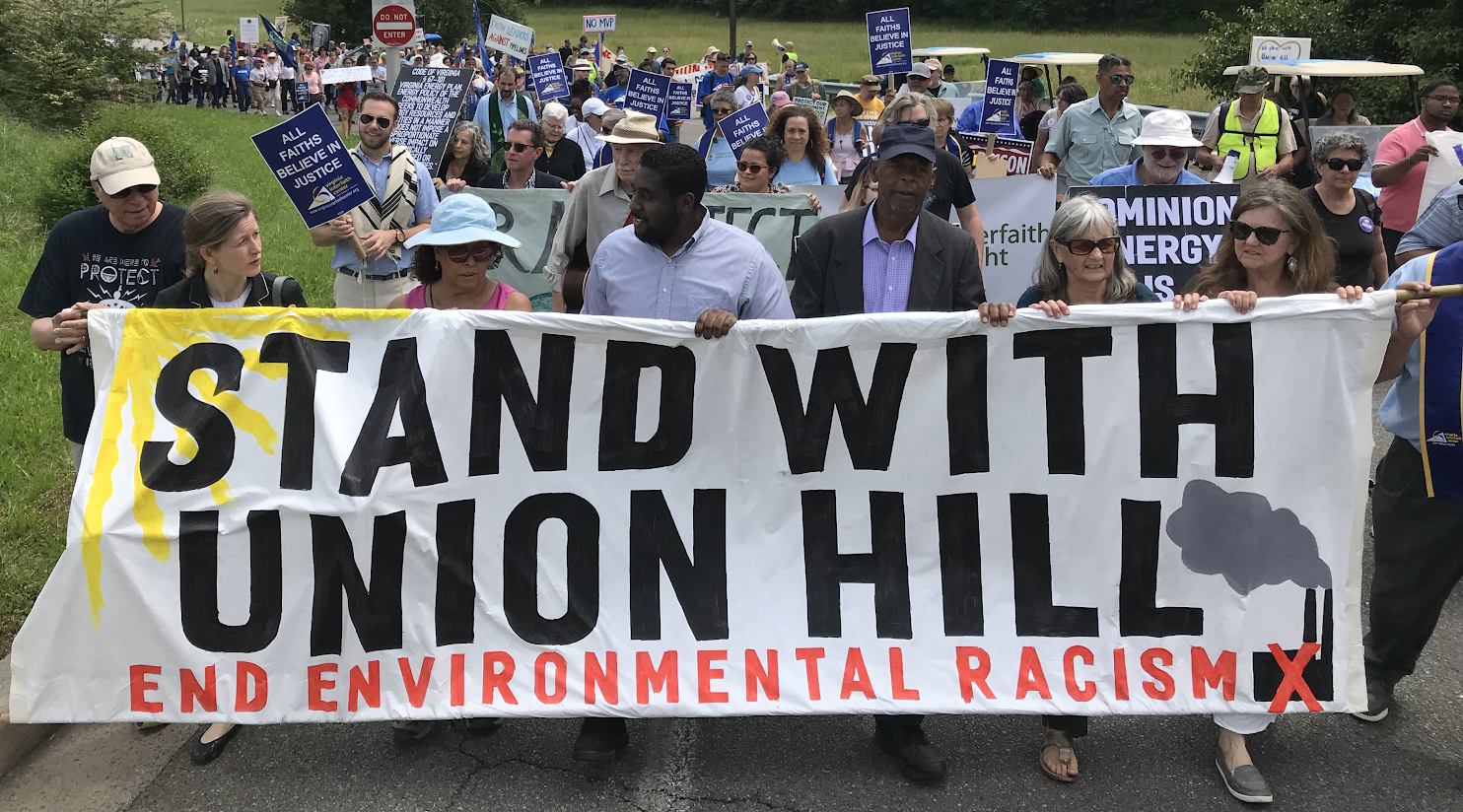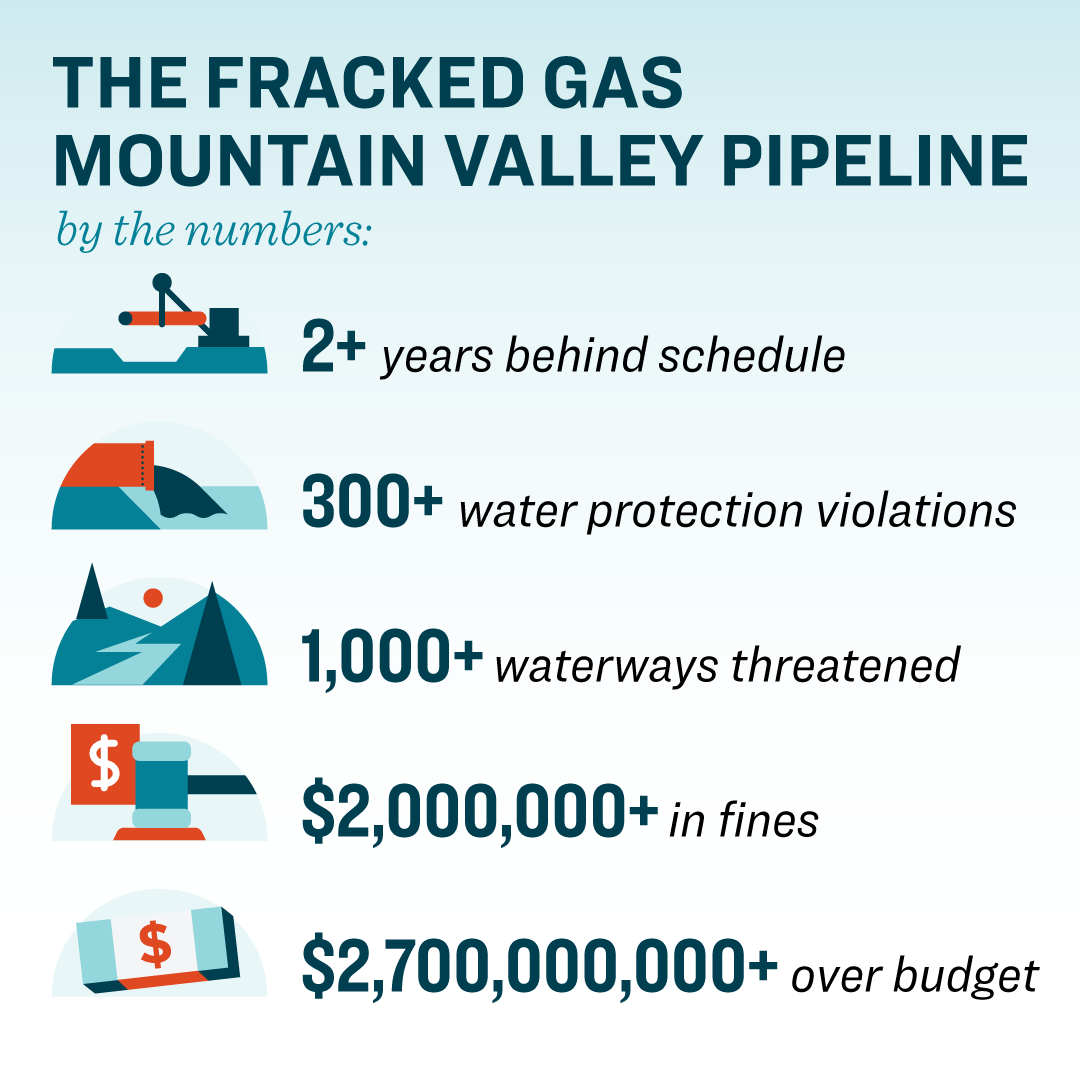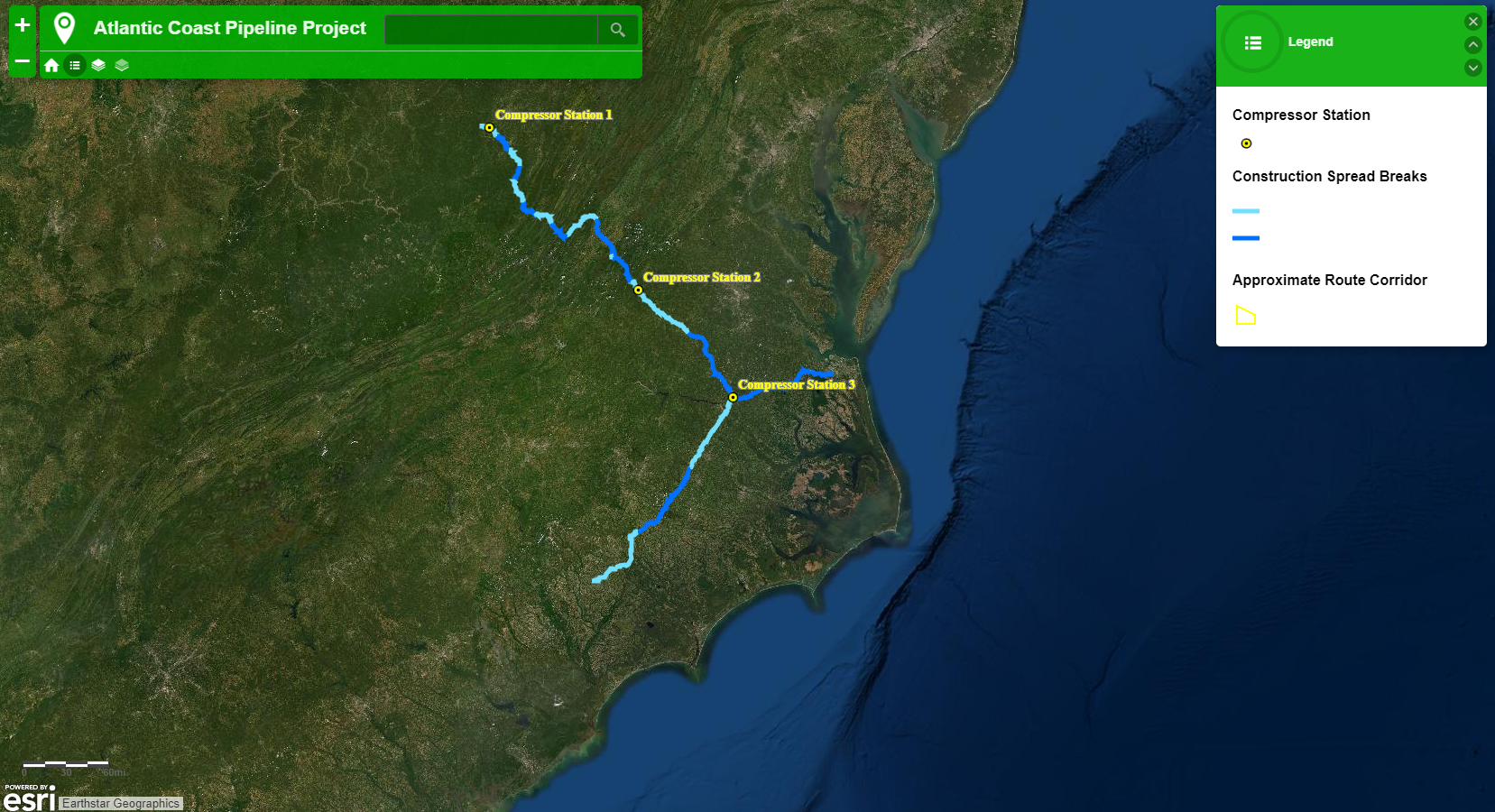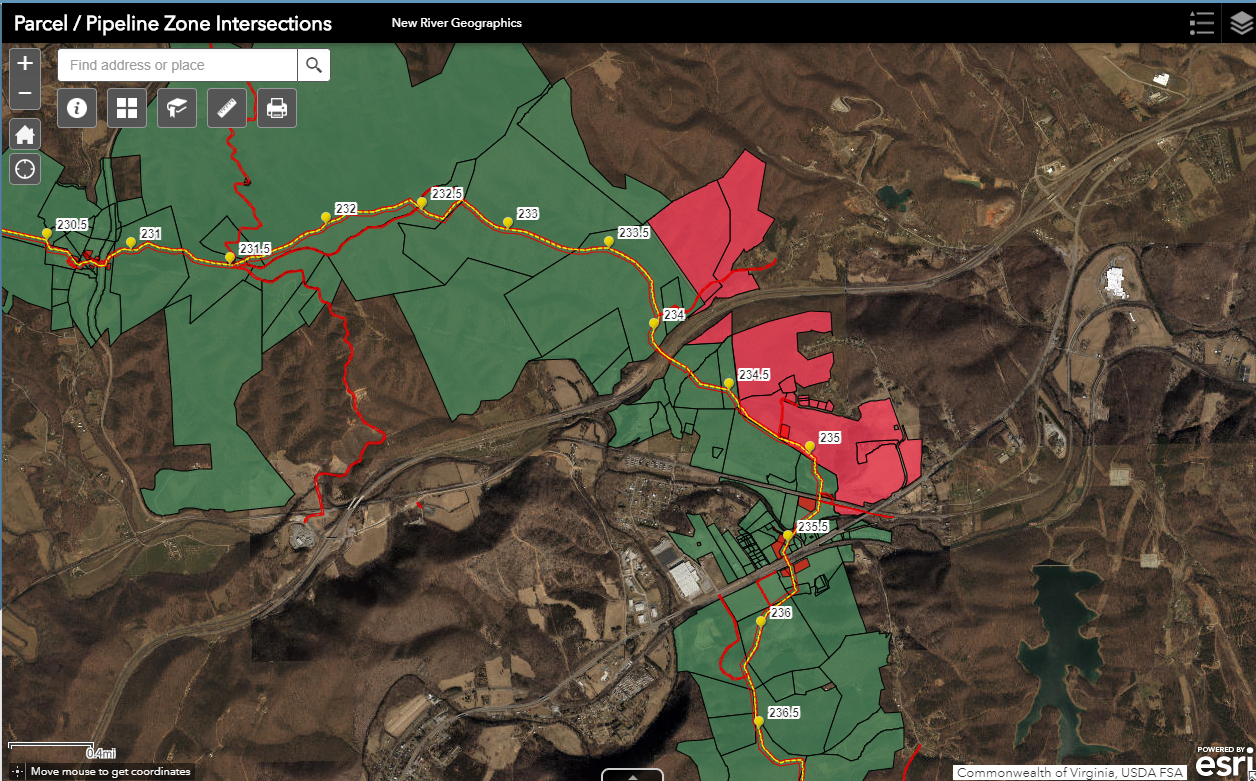Protect Virginia’s communities, water, air and ecosystems from the dangerous, unneeded Mountain Valley & Atlantic Coast pipelines!

Virginia's energy future should not include new fossil fuel infrastructure.
Campiagn Contact:

Lynn Godfrey, Community Outreach Coordinator
(757) 305-8284
lynn.godfrey[at]sierraclub.org
Mountain Valle Pipeline: Unnecessary, Expensive, and Dangerous

We are working with thousands of Virginians and coalition partners to stop the Mountain Valley pipeline and more unneeded, dangerous fracked-gas projects that will harm our communities and our environment.
Sierra Club is in opposition to the Atlantic Coast Pipeline, Mountain Valley Pipeline, its Southgate Extension, and the Virginia Natural Gas Header Improvement Project because:
-
The projects are examples of systemic environmental injustice as the pipelines’ paths disproportionately cross through communities of color, Indigenous communities, low income, and elderly communities.
-
Learn more about the historic African-American community of Union Hill
-
Rural Virginia activist, 75, vows to ‘keep on fighting’ Atlantic Coast Pipeline
-
Pipelines damage water quality with increased sediment and chemical pollution due to construction crossing numerous watersheds, rivers, streams, springs, wetlands and riparian areas.
-
Pipelines increase our dependence on fracked gas and will generate at least 95 million tons/year of greenhouse gas emissions, exacerbating the climate crisis.
-
Pipelines cross unstable and unsafe karst geology in numerous counties in Virginia.
-
Compressed fracked gas pipelines flowing at high pressure often leak and can explode.
-
The pipelines fragment more than 50 miles of National Forest property and cross the nationally known and highly popular Blue Ridge Parkway, the Great Eastern Trail, and the iconic Appalachian Trail.
-
Pipeline construction negatively impacts threatened and endangered species along the routes.
-
Use of eminent domain to acquire rights of way that landowners are unwilling to grant and causing significant decreases in property values.
View the routes of ACP and MVP mainline
Support Volunteer-led monitoring
Latest News
2020 has included multiple legal challenges, agency permit decisions and community events:
On March 3, Sierra Club filed as a respondent to the State Corporation Commission, along with Chesapeake Climate Action Network, jointly represented by Appalmad, for the Virginia Natural Gas “Header Improvement Project.” Public comments are due by April 28 and the SCC hearing is May 12, 2020. A statewide coalition of groups are working on educational outreach for this project.
On February 28, Transco reiterated their concerns with the MVP Southgate Expansion, stating that “it is convenient, but nevertheless disingenuous, for MVP to claim that Transco is seeking to disrupt the proceedings when MVP controlled the timing of its disclosure to Transco of the information which established that Transco’s interests could be adversely affected."
On February 24, the Supreme Court of the United States heard “US Forest Service v Cowpasture River Preservation Association” regarding the Forest Service’s overstep in giving ACP permission to cross the Appalachian Trail. Pipeline fighters from across Virginia waited overnight in line to obtain tickets to the oral arguments.
On February 18, Morgan Stanley announced “"We believe this project will not move forward due to legal risks, and as a result [Dominion] will pursue additional renewables investments that will allow them to maintain their 5.5% EPS growth target," analysts wrote. Many analyists were in attendance at the SCOTUS hearing.
At the close of February, House Bill 646, which addressed water quality violations from pipelines was passed through both the House of Delegates and State Senate. This bill authorizes an increase in the fine for each violation and for each order. Civil penalties will increase to up to $50,000 per violation and $500,000 per order and reinforces the most stringent and safest permitting processes available and holds companies accountable. HB 646 was met with bipartisan support. The remaining pipeline legislation from Delegate Chris Hurst, HB 643 & HB 644, both passed the House of Delegates, but were met with resistance from members of the Senate Agriculture Committee, who expressed a lack of faith in the ability of Citizens Boards and from the fossil fuel industry who incorrectly characterized the impacts of the bills.
In late January and late February, Sierra Club submitted letters in the FERC docket about MVP’s requests to perform additional activities along the MVP mainline.
On February 14, FERC issued the Final Environmental Impact Statement for MVP Southgate.
On January 7, the 4th Circuit court vacated the air permit for the Compressor Station for the Atlantic Coast Pipeline, concluded that the board improperly relied on federal and state air quality standards without deciding whether the compressor station represented an environmental injustice to Union Hill residents, some of whom are descendants of slaves who founded the community after the Civil War. “But environmental justice is not merely a box to be checked, and the board’s failure to consider the disproportionate impact on those closest to the compressor station resulted in a flawed analysis,” Judge Thacker wrote.
On January 3, Protect Our Water, Heritage, Rights filed a constitutional challenge in the federal district court in Washington, D.C., challenging the authority of the Federal Energy Regulatory Commission (FERC) to issue certificates to any and all pipeline companies, including the Mountain Valley Pipeline (MVP).
News from 2019
On December 3, Sierra Club responded to a November 18 letter submitted by MVP to FERC, which misconstrues the Nov 5 letter submitted by Sierra Club and other groups. Sierra Club also reiterated series concerns of ongoing degradation of endangered species habitat along the MVP right-of-way.
On November 27, the comment period for the consent decree period closed. Over 200 comments were received and groups such as P.O.W.H.R submitted comprehensive comments. Wild Virginia also submitted comprehensive comments, which the Sierra Club Chapter signed on to.
On November 5, Sierra Club submitted a letter to FERC regarding the ongoing degradation of endangered species habitat along the route of MVP.
On October 29, it was announced by the Franklin County, VA Commissioner of Revenue that Mountain Valley Pipeline owes $1.5 million in unpaid taxes
On October 22, Mountain Valley Pipeline announced that the cost of the project had risen by another half a billion dollars.
On October 15, the Federal Energy Regulatory Commission ordered that construction activities along the entire 303-mile route of Mountain Valley Pipeline must stop.
On October 11, the U.S. Court of Appeals for the Fourth Circuit put a hold on two permits required by MVP for construction activities.
On October 11, the Attorney General’s office announced a $2.15M settlement against Mountain Valley Pipeline for their lawsuit, which was necessitated by over 300 violations documented by the Department of Environmental Quality. This decision opened a public comment period through November 27.
On October 1, Delegate Chris Hurst and 17 additional Virginia legislators wrote the Federal Energy Regulatory Commission (FERC) requesting suspension of the MVP Certificate of Public Convenience and Necessity.
On September 29 & 30, hundreds of Virginians celebrated the Fourth Annual “Hands Across the Appalachian Trail,” drawing attention to the need to protect and preserve the national treasure from any pipeline impacts
On August 28, FERC requested that the U.S. Fish and Wildlife Service reinitiate consultation on its Endangered Species Act permit for MVP.
On August 15, MVP, LLC “voluntary” suspended construction areas in areas along that Mountain Valley pipeline that include the habitat of the Roanoke log perch, candy darter and Indiana bat.
On August 9, a new lawsuit was launched by Sierra Club and with six other environmental groups, challenging the U.S. Fish & Wildlife’s approval of the Mountain Valley pipeline.
On August 2, the Virginia Department of Environmental Quality issued a 2-mile stop work order on Mountain Valley pipeline
On July 26, the 4th Circuit Court of Appeals vacated a federal permit because it failed to adequately protect endangered or threatened species in the path of the ACP.
On July 26, the Federal Energy Regulatory Commission (FERC) issued the draft environmental impact statement for MVP’s proposed Southgate extension, with a comment period open until September 16, 2019.
On July 11, 18 Virginia legislators wrote FERC and asked for a stop work order and suspension of the Certificate of Public Convenience and Necessity for the Atlantic Coast Pipeline.
On May 18, hundreds of Virginians gathered in Leesburg, VA to ask Attorney General Mark Herring for “Herring, Stand with Appalachia: No Mountain Valley Pipeline”
On May 17, 2019, hundreds of Virginians marched for environmental justice in Richmond, VA for “End Environmental Racism Now: March with Union Hill.”
Permits and legal challenges:
-
The lawsuit brought by Friends of Buckingham against DEQ and the Air Pollution Control Board for their permitting decision had oral arguments heard on October 29. The court ruled in favor of Friends of Buckingham!
-
Sierra Club filed a legal challenge on August 9 challenging the U.S. Fish and Wildlife Service’s approval of Mountain Valley pipeline.
-
U.S. Fish and Wildlife Service Biological Opinion (BO)/Incidental Take Statement (ITS) – ACP only. Permit vacated on July 26, 2019.
-
Forest Service (USFS) Special Use Permit (SUP) and Right-of-way (ROW) permit. The SUP was Struck down by the Fourth Circuit Court for both pipelines. The court vacated the USFS SUP and Record of Decision, citing an inexplicable and capricious decision on the part of the USFS to reverse course on environmental concerns, seemingly in obeisance to ACP.
-
Appalachian Trail crossings: The 4th U.S. Circuit Court of Appeals threw out a permit issued by the U.S. Forest Service to allow the gas pipelines to tunnel beneath the Appalachian Trail. The Forest Service’s decisions violate the NFMA and NEPA, and that the Forest Service lacked statutory authority pursuant to the [Mineral Leasing Act] to grant a pipeline right of way across the Appalachian National Scenic Trail. Dominion has appealed this decision and asked the Supreme Court of the United States to hear the case. Their case will be heard by the SCOTUS on February 24, 2020.
-
Army Corps of Engineers (USACE) Nationwide permit 12 (NWP 12): These permits have not been restored. That process is now underway and West Virginia officials recently accepted public comments for the NWP 12.
ACP and MVP News Archive
Going Strong: The Continued Fight to Stop the Mountain Valley Pipeline
Why the Mountain Valley Pipeline is uniquely risky
Rural Virginia activist, 75, vows to ‘keep on fighting’ Atlantic Coast Pipeline
New lawsuit launched against Mountain Valley pipeline
MVP suspends some pipeline activity
MVP facing new legal challenges
DEQ Stop Work order - 2 miles of MVP
Mountain Valley Pipeline takes on Appalachian Trail battle
4th Circuit vacates federal permit for ACP related to Endangered Species Act
Pipeline politics, MVP and ACP face rocky road
Environmental Injustice + Union Hill
FERC: Southgate pipeline would have ‘some adverse impacts’ that could be reduced
Getting in the way: Inside the standoff over the Mountain Valley Pipeline
New challenge for Mountain Valley Pipeline
Al Gore meets with residents fighting gas pipeline station
Al Gore, Civil Rights Leader William Barber call on Northam to seek forgiveness through action
The Fight For The Atlantic Coast & Mountain Valley Pipelines
Criminal investigation of Mountain Valley Pipeline underway, document shows
Where’s the pipeline hearing you promised?
Can the pipeline be stopped? State board ponders its next move on MVP
Atlantic Coast permit pileup: Where things stand
Air Board approves permit for ACP compressor station
Bernstein analysts say Mountain Valley, Atlantic Coast pipeline projects may not get finished
Roanoke attorneys seek criminal investigation of Mountain Valley Pipeline
Mountain Valley Pipeline files response to state's lawsuit

